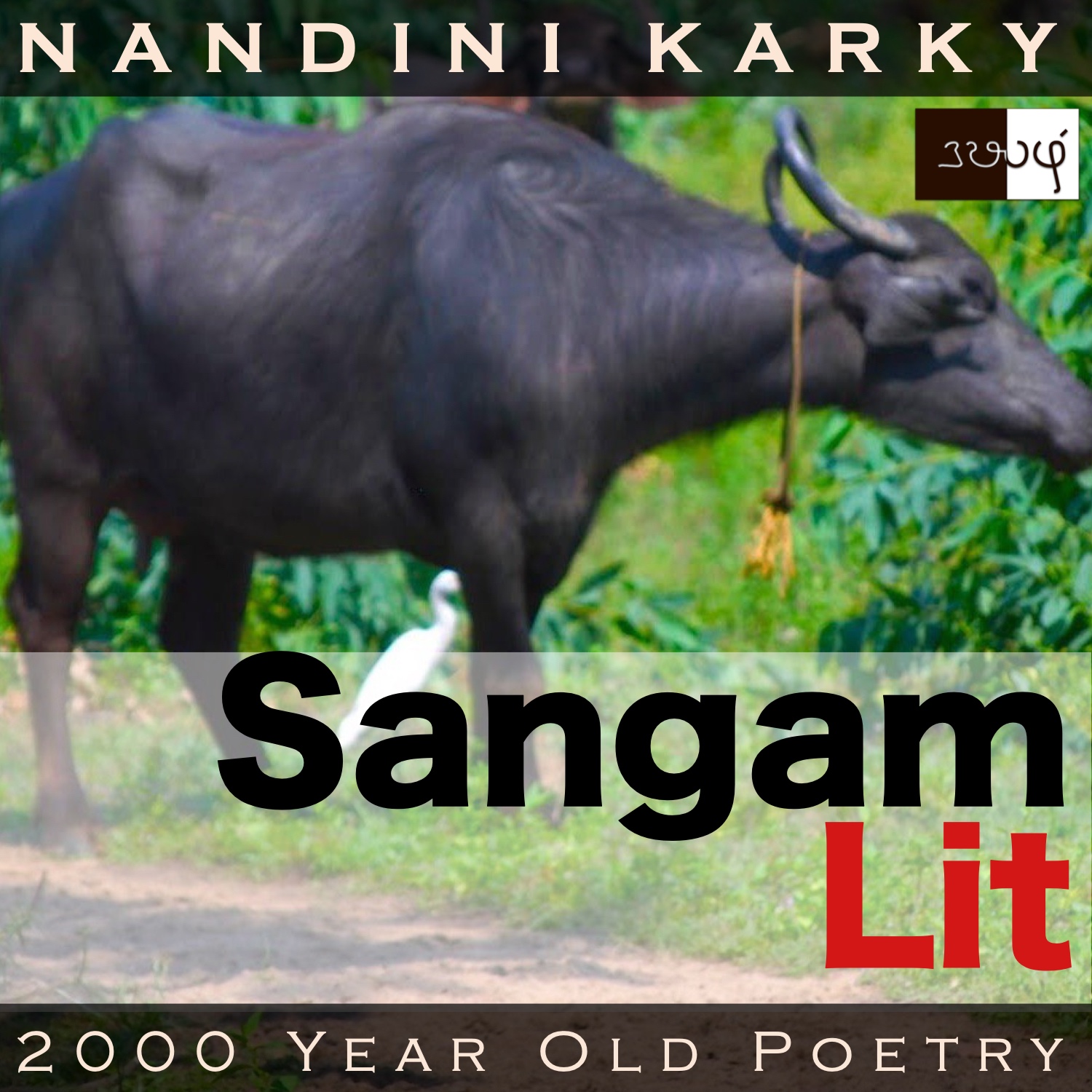Podcast: Play in new window | Download
Subscribe: Apple Podcasts | Spotify | Amazon Music | Android | iHeartRadio | TuneIn | RSS | More

In this episode, we observe scenes from a farmland and perceive the complexities of life therein, as portrayed in Sangam Literary work, Natrinai 330, penned by Aalankudi Vankanaar. The verse is situated in the agricultural regions of ‘Marutham’ and speaks in the voice of the confidante to the man, refusing him entry into the lady’s house.
தட மருப்பு எருமைப் பிணர்ச் சுவல் இரும் போத்து,
மட நடை நாரைப் பல் இனம் இரிய,
நெடு நீர்த் தண் கயம் துடுமெனப் பாய்ந்து,
நாட் தொழில் வருத்தம் வீட, சேண் சினை
இருள் புனை மருதின் இன் நிழல் வதியும்
யாணர் ஊர! நின் மாண் இழை மகளிரை
எம் மனைத் தந்து நீ தழீஇயினும், அவர்தம்
புன் மனத்து உண்மையோ அரிதே: அவரும்,
பைந் தொடி மகளிரொடு சிறுவர்ப் பயந்து,
நன்றி சான்ற கற்பொடு
எம் பாடு ஆதல் அதனினும் அரிதே.
Opening with ‘தட மருப்பு எருமை’ meaning ‘a buffalo with curved horns’, the verse brings to the fore, this well-known denizen of the agricultural country. Next, we meet with the ‘மட நடை நாரை’ or ‘storks with delicate gait’, a curious expression that sketches the image of a feathered body balancing on stilts. ‘நெடு நீர்த் தண் கயம்’ is an expression for ‘cool and wide pond’ and serves to indicate the water-rich lands that dominate this domain. The phrase ‘நாட் தொழில் வருத்தம் வீட’ means ‘letting go the tiredness in the day’s work’ is significant and establishes the tiring nature of work in the farmlands. From the outer facets of the lands, we delve into the mind with the phrase ‘புன் மனத்து உண்மையோ அரிதே’ meaning ‘hard to see the truth in those lowly hearts’. The verse ends with ‘எம் பாடு ஆதல் அதனினும் அரிதே’ meaning ‘to be equal to our status, it’s even harder’ and intrigues us with these abstract notions of truth and status!
The man and lady had been leading a married life, when the man took to keeping the company of courtesans. After a while, the man wants to return to his lady and seeks the confidante’s help. To his request to enter the lady’s house, the confidante says, “Making the dainty-gaited flock of storks flutter away, a huge male buffalo with curved horns and a rough neck leaps suddenly into a wide, cool pond and washes away the tiredness of the day’s hard work. It then takes rest in the pleasant shade of the ‘marutham’ tree, which weaves darkness with its long branches. Such is your fertile and prosperous town, O lord! Even if you bring those fine jewelled maiden to our home and embrace them herein, it would be rare to find the true love in their barren minds. And, even if they were to birth and raise girls with fine bangles and boys too, they cannot be equal to us, the women who live with laudable, good chastity!” With these words, the confidante reprimands the man for his actions in hurting the lady by seeking the company of courtesans.
Now, for the nuances! The confidante opens her words to the man by describing a scene from the farmlands. Ahead of us, we see a huge male buffalo with curved horns and matted hair on his neck, walking. As we follow the animal, we find it taking a plunge into a cool pond nearby, startling the slender-legged birds therein. Here, the buffalo is seen playing in the water and the confidante adds that the buffalo is in fact letting go of the tiredness of its day’s work. What hard work indeed it is, in these agricultural lands! It’s not the easy grazing in wild forest lands but ploughing the fields and doing the same routine work, which is sure to be a burden to both man and beast. The drudgery of working in those farmlands is what continues in many other forms in the industries and offices of today! Returning to the verse, the buffalo, after playing in the water, seeks out the shade of the ‘Marudham’ or ‘Arjuna tree’. A little about this tree, which not only gives its name to this agricultural landscape but also to the well-known city of ‘Madurai’, which came from the word ‘Marudhai’, a place, which was once densely filled with these same trees. These are sturdy trees that have a wide canopy and now we understand why our buffalo seems to prefer to lie in the dark and cool shade of this tree. The confidante concludes this scene as if to describe the man’s fertile town but she hides more within, for sure!
The confidante then comes to the core issue and tells the man that even if he were to bring the courtesans home and live with them, he would find it hard to see the truth in their love. She seems to be hinting at the perception that the courtesans favoured wealth more than love. Then, she adds that even if those women were to bear children for the man, the status of the courtesans could never match that of the lady, a woman of good chastity! With these words, the confidante seems to be berating the courtesans. What could be the reason for this? This reason, it turns out, she hides within the scene of the buffalo seeking the shade of the ‘Marutham’ tree instead of returning to its shed at home. Here, she presents the metaphor of the man seeking the company of courtesans instead of finding his happiness with the lady at home. As we have seen in other poems, these love-quarrels do seem to crop up in these farmlands, places where work is a drudgery, and where wealth accumulates in the hands of a few! However, in this poem, leaving behind such seriousness, I would like to focus a tiny facet. Isn’t it funny that no matter how the confidante conceals it in fine words, in the end, she is simply calling the man, a buffalo?!




Share your thoughts...